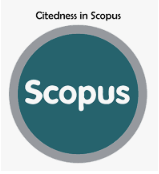The Impact of Quranic Storytelling Methods on the Development of Students' Akhlakul Karimah
Pengaruh Metode Bercerita Kisah Dalam Al-Quran Terhadap Akhlak Karimah Peserta Didik
DOI:
https://doi.org/10.56404/tej.v3i1.132Keywords:
Learning Methods, Storytelling Method, Noble CharacterAbstract
This study was motivated by the researcher's desire to re-examine the theory of the storytelling method expressed by Poerwadarminta and Amin. In Poerwadarminta's theory, it is stated that the storytelling method can arouse the enthusiasm of students' learning in learning the morals of morals. It is hoped that by using this storytelling method, students can have a noble, ethical personality, and have good role models. While Samsul Munir Amin revealed that there are several praiseworthy characteristics of morals towards oneself, but in this study only discusses 3 characteristics, namely trustworthiness, forgiveness, and patience. The result of this study 1. There is no significant effect between the method of telling story the results of statistical calculations using the simultaneous test that fcount 0.595 < ftabel 3.287 with a sign level of 0.451> 0.05. Meanwhile, by using a partial test that tcount -0.772 < 1.753 with a sign level of 0.451> 0.05. So from these calculations it states that Ho is accepted and Ha is rejected, indicating that there is no significant influence between the method of telling stories in the Koran on the trustworthy nature of 4th grade students in moral teaching. 2. There is no significant effect between the method of telling stories in the Koran on the forgiving nature of students with the results of statistical calculations using the simultaneous test that fhitung 3.712> ftabel 3.287 with a sign level of 0.451> 0.05. Meanwhile, by using a partial test that tcount 1.927> 1.753 with a sign level of 0.451> 0.05. So from these calculations it states that Ho is accepted and Ha is rejected, indicating that there is no significant influence between the method of telling stories in the Koran on the forgiving nature of 4th grade students in moral teaching. 3. There is no significant effect between the method of telling stories in the Koran on the patient nature of students with the results of statistical calculations using the simultaneous test that fhitung 4.206> ftabel 3.287 with a sign level of 0.451> 0.05. Meanwhile, using the partial test that the tcount is 2.051> 1.753 with a sign level of 0.451> 0.05. So from these calculations it states that Ho is accepted and Ha is rejected, indicating that there is no significant influence between the method of telling stories in the Koran on the patient nature of 4th grade students in the learning of moral creed
References
Sutrisno, “Berbagai Pendekatan Dalam Nilai dan Pendidikan Kewarganegaraan,” Jurnal Dimensi Pendidikan dan Pembelajaran, vol. 5, no. 1, p. 30, 2016.
A. Munjin Nasih, Metode dan Teknik Pembelajaran Pendidikan Agama Islam. Bandung: PT Rafika Adi Tama, 2009.
A. Haris, “Kajian Kisah-Kisah Dalam Al-Quran (Tinjauan Historis Dalam Memahami Al-Quran),” Jurnal Penelitian dan Pemikiran Keislaman, vol. 5, no. 1, p. 60, 2018.
S. Yasnel, Akidah Akhlak. Pekanbaru: CV. Mutiara Pesisir Sumatra, 2014.
M. A. Andi, “Nilai Aqidah, Ibadah, Syariah, dan Al-dharuriyat Al- Sittah Sebagai Dasar Normatif Pendidikan Islam,” AJIE ( Al-Gazali Journal of Islamic Education), vol. 1, no. 1, p. 90, 2022.
M. H. Ginanjar, Budaya Kerja Syariah di Perguruan Tinggi. Bogor: Al-hidayah Press, 2017.
M. H. Ginanjar, “Pembelajaran Akidah Akhlak dan Korelasinya Dengan Peningkatan Akhlak Al-Karimah Peserta didik,” Jurnal Edukasi Islam : Jurnal Pendidikan Islam, vol. 6, no. 12, p. 104, 2017.
I. Suryani, “Metode Kisah Dalam Pembelajaran Pendidikan Islam,” Jurnal Pendidikan Konseling, vol. 5, no. 2, p. 5469, 2023.
A. N. Heni and S. Z. Naila, “Krisis Akhlak dan Sosial Manusia di Era Modern,” Jurnal Pendidikan Tambusai, vol. 7, no. 3, p. 29475, 2023.
Noveriyanto, “Implementasi Nilai-Nilai Akhlakul Karimah Melalui KegiatanMonitoring Pada Mahasiswa Muhammadiyah Bengkulu,” An-Nizom: Jurnal Penelitian Manajemen Pendidikan Islam, vol. 4, no. 1, p. 26, 2019.
M. Irfangi, “Implementasi Metode Kisah Dalam Pembelajaran Akidah Akhlak Di Madrasah Aliyah,” Jurnal Kependidikan, vol. 5, no. 1, p. 79, 2017.
V. Wiratna Sujarweni, Metodologi Penelitian Lengkap, Praktis, dan Mudah dipahami. Yogyakarta: PT. Pustaka Baru, 2019.
N. Hasnunidah, Metodologi Penelitian Pendidikan. Yogyakarta: Media Akademi, 2017.
Sugiyono, Metode Penelitian Kuantitatif, Kualitatif, dan Rnd. Bandung: Alfabeta, 2013.
M. Jaarvis, Psikologi Perkembangan Kognitif. Jakarta: Nusamedia, 2021.
Mudjiran, Psikologi Pendidikan Penerapan Prinsip-Prinsip Psikologi dalam Pembelajaran. Jakarta: Kencana, 2021.
A. Fajar Prasetya, Mengelola Emosi. Yogyakarta: K-Media, 2018.
R. Solihin, Akidah Akhlak dalam Perspektif pembelajaran di Madrasah Ibtidaiyah. Indramyu: Penerbit Adab, 2020.
M. Nurhadi, Pendidikan Kedewasaan dalam Perspektif Psikologi Islam. Yogyakarta: Deepublish, 2014.
M. C. Muzaini and A. Mahmudah, “Pendekatan Ketauladanan Perspektif Pendidikan Islam Dalam Pembinaan Karakter Peserta Didik Sekolah Dasar,” vol. 4, no. 1, p. 26, 2023.
















